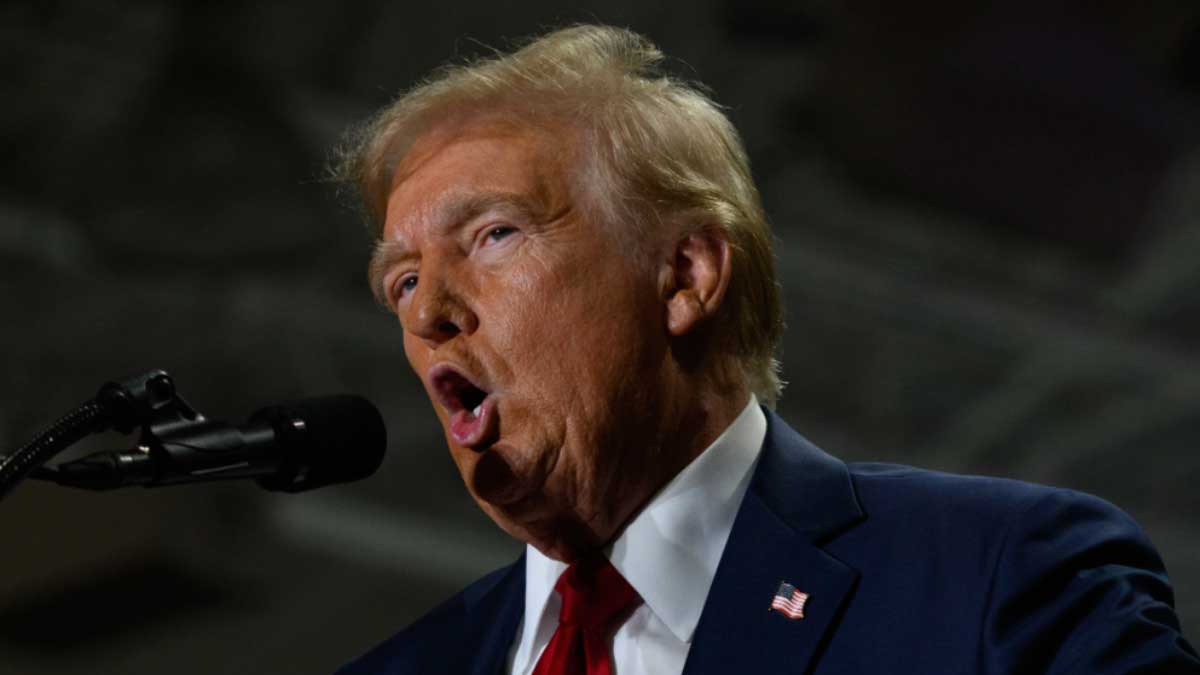- Home
- Billionaires
- Investing Newsletters
- 193CC 1000
- Article Layout 2
- Article Layout 3
- Article Layout 4
- Article Layout 5
- Article Layout 6
- Article Layout 7
- Article Layout 8
- Article Layout 9
- Article Layout 10
- Article Layout 11
- Article Layout 12
- Article Layout 13
- Article Layout 14
- Article Sidebar
- Post Format
- pages
- Archive Layouts
- Post Gallery
- Post Video Background
- Post Review
- Sponsored Post
- Leadership
- Business
- Money
- Small Business
- Innovation
- Shop
Recent Posts
Trump Criticized for Renewed Attacks on Kamala Harris

Former President Donald Trump has come under fire once again for making personal attacks on Vice President Kamala Harris, a pattern that has sparked condemnation from both advocates and some members of his own party. During a rally in Erie, Pennsylvania, Trump reiterated his earlier remarks that Harris was “born mentally impaired,” a claim he first made at a previous rally in Prairie du Chien, Wisconsin. These remarks, specifically targeting Harris, have been perceived as inflammatory and offensive, drawing backlash from disability advocates and prominent Republicans alike.
At the Pennsylvania rally, Trump did not hold back in his criticism of the Biden administration, stating, “Crooked Joe Biden became mentally impaired,” before quickly pivoting to Harris. “But lying Kamala Harris, honestly, I believe she was born that way,” Trump continued, suggesting that her mental faculties had always been impaired. This mirrored his comments from the Wisconsin rally, where he blamed both Biden and Harris for the state of the country, remarking, “And if you think about it, only a mentally disabled person could have allowed this to happen to our country.”
Trump’s comments have spurred widespread criticism, particularly from disability rights advocates, who argue that his language is ableist and deeply harmful. The American Association of People with Disabilities (AAPD) swiftly responded with a statement condemning the former president’s remarks. “Trump’s ableist comments yesterday say far more about him and his inaccurate, hateful biases against disabled people than it does about Vice President Harris, or any person with a disability. Trump holds the ableist, false belief that if a person has a disability, they are less human and less worthy of dignity,” the organization stated.
Even within his own party, Trump’s rhetoric has drawn reproach. Senator Lindsey Graham (R-S.C.), when asked about Trump’s remarks, expressed disagreement with the personal nature of the attacks. “I just think the better course to take is to prosecute the case that her policies are destroying the country,” Graham said. He emphasized that focusing on policy differences, rather than personal insults, would be a more effective strategy. Similarly, former Maryland Governor Larry Hogan (R) voiced his displeasure with Trump’s comments. Speaking on CBS, Hogan said, “I think that’s insulting not only to the vice president, but to people that actually do have mental disabilities,” adding that Trump’s divisive rhetoric was something “we could do without.” Hogan has been a long-time critic of Trump’s approach to politics, particularly his use of inflammatory language to stoke division.
The backlash comes at a time when some Republicans are urging Trump to tone down his personal attacks and focus on policy contrasts with his Democratic opponents. Many within the GOP believe that such personal attacks could alienate potential voters and distract from the substantive issues at play. In mid-August, however, Trump made it clear that he feels justified in making personal attacks against Harris. He claimed to be “entitled” to such rhetoric, expressing anger over what he believes Harris has done to the country. Throughout Harris’ tenure as vice president, Trump has continually attacked her intelligence, mocked her laugh, and even made comments about her racial identity, suggesting she has altered her heritage from Indian to Black for political gain.
Despite the criticism, Trump has not shown signs of backing down. During an interview with Fox News Digital on September 16, Trump doubled down on his rhetoric, blaming Harris and Biden for allegedly inciting violence against him. He referred to a recent assassination attempt, claiming that the suspect “believed the rhetoric of Biden and Harris, and he acted on it.” Although the FBI has not confirmed any motive in the case, Trump argued that the administration’s rhetoric was directly responsible for the attack, stating, “Their rhetoric is causing me to be shot at.” This accusation has only added to the controversy surrounding Trump’s inflammatory language, as critics question the validity of his claims and the potential consequences of his rhetoric.
The ongoing feud between Trump and Harris comes as national polling data shows Harris holding a slim lead over the former president in hypothetical matchups. According to FiveThirtyEight’s latest national polling average, Harris leads Trump by 2.8 points. RealClearPolitics’ average reflects a similar trend, showing Harris ahead by two points as of Sunday afternoon. Despite this slight lead, both Harris and Trump remain polarizing figures, with their approval ratings reflecting deep divisions among voters.
Trump’s latest remarks are just the most recent in a long history of controversial comments targeting political rivals. Throughout his political career, Trump has been known for using harsh and often personal rhetoric to attack his opponents, a strategy that has energized his base but alienated more moderate voters. The Republican Party remains divided over how to approach the 2024 election, with some members advocating for a return to a more traditional, policy-driven campaign, while others support Trump’s confrontational style.
As the election season heats up, it remains to be seen whether Trump’s repeated personal attacks will help or hinder his chances of securing the Republican nomination. For now, however, the backlash from his recent remarks suggests that even within his own party, there are limits to how far Trump’s rhetoric can go. Advocates for disability rights, as well as political figures across the spectrum, continue to call for a more respectful and policy-oriented debate, urging Trump to refrain from language that many consider harmful and divisive.
In the meantime, Harris has largely avoided responding directly to Trump’s comments, choosing instead to focus on her policy agenda. As the vice president navigates the challenges of the upcoming election, the ongoing feud with Trump is likely to continue, with personal attacks remaining a key feature of the former president’s campaign strategy. Whether this approach will resonate with voters or backfire remains one of the central questions of the 2024 race.
Recent Posts
Categories
- 193cc Digital Assets2
- 5G1
- Aerospace & Defense46
- AI37
- Arts3
- Banking & Insurance11
- Big Data3
- Billionaires449
- Boats & Planes1
- Business328
- Careers13
- Cars & Bikes76
- CEO Network1
- CFO Network17
- CHRO Network1
- CIO Network1
- Cloud10
- CMO Network18
- Commercial Real Estate7
- Consultant1
- Consumer Tech180
- CxO1
- Cybersecurity68
- Dining1
- Diversity, Equity & Inclusion4
- Education7
- Energy8
- Enterprise Tech29
- Events11
- Fintech1
- Food & Drink2
- Franchises1
- Freelance1
- Future Of Work2
- Games141
- GIG1
- Healthcare78
- Hollywood & Entertainment186
- Houses1
- Innovation42
- Investing2
- Investing Newsletters4
- Leadership65
- Lifestyle11
- Manufacturing1
- Markets20
- Media193
- Mobile phone1
- Money13
- Personal Finance2
- Policy567
- Real Estate1
- Research6
- Retail1
- Retirement1
- Small Business1
- SportsMoney33
- Style & Beauty1
- Success Income1
- Taxes2
- Travel10
- Uncategorized8
- Vices1
- Watches & Jewelry2
- world's billionaires418
Related Articles
Trump Moves $4B Stake in Truth Social Parent, Stock Drops 6%
Donald Trump recently transferred his 57% stake in Trump Media & Technology...
By 193cc Agency CouncilDecember 20, 2024House Rejects Trump-Backed Funding Bill, Shutdown Looms
The U.S. House of Representatives rejected a new government funding bill on...
By 193cc Agency CouncilDecember 20, 2024Trump Named Time’s Person of the Year for Second Time
On Thursday, Time magazine honored Donald Trump as its “Person of the...
By 193cc Agency CouncilDecember 12, 2024Meta Donates $1 Million to Trump’s Inaugural Fund
Meta, the parent company of Facebook and Instagram, has confirmed a $1...
By 193cc Agency CouncilDecember 12, 2024















Leave a comment